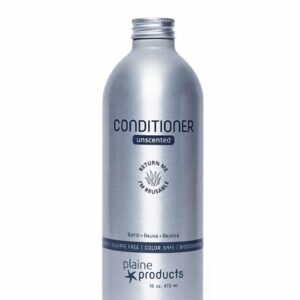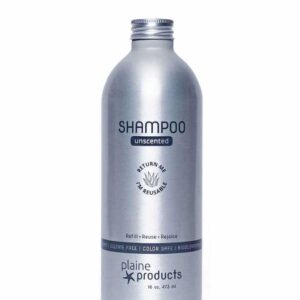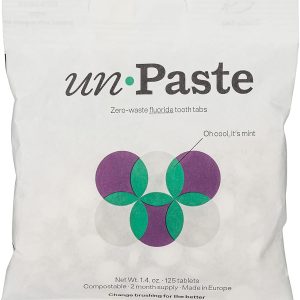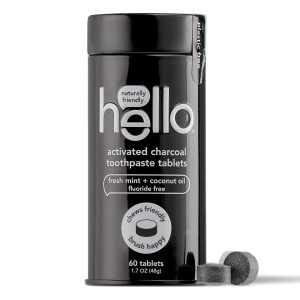Looking for inspiration to revitalize your bathroom into a zero waste bathroom? These zero waste bathroom swaps can help you! It’s easy to get into convenience-based habits in our bathroom routine, but all it takes is a few easy swaps to get you started on your zero waste journey. Even if you replace just one item in your bathroom with a sustainable alternative, you’re off to a great start.
We may get commissions from links on this site. Thank you for supporting us and our mission!
Our favorite zero waste bathroom swaps
1. Soap → Zero waste soap
This is one of the easiest zero waste bathroom swaps to make. Anything from a single pack of Dove bar soap to, one of our favorites, Plaine Products Bath and Body Soap, are plastic-free, easily available, and good for both hands and body washing. There is a plethora of other zero waste soap options, from handmade goat milk soap at your local farmer’s market to the liquid soaps from Plaine Products.
2. Toilet paper and facial tissues → Recycled toilet paper and facial tissues
Virgin wood pulp for regular toilet paper requires about twice the amount of water to manufacture compared to recycled toilet paper. Since these products are single use, it’s extra important that they are sustainably produced. We’ve been trying out Who Gives a Crap bamboo toilet paper and have now completely replaced our store-bought toilet paper – I especially love that even the packaging is plastic-free! If you’re not up for a toilet paper subscription service, Seventh Generation is a recycled toilet paper and facial tissue brand available at most U.S. supermarkets and drugstores.
3. Toilet paper → Bidet
Are you truly ready for a zero waste bathroom? Then you might be ready to remove the need for toilet paper altogether! Imagine all the water and energy it takes to produce all the toilet paper you use at home, when you could just use a bidet and a washable towel. The amount of water bidets use is still much less than the amount it takes to manufacture toilet paper. Bidets last a lifetime. You could also install a graywater system to reuse water for flushing and to save money on your home water bill.
4. Synthetic towels → Bamboo or hemp towels
Some hand towels, body towels, and washcloths are made from microfibers, which contain plastics such as nylon and polyester. Plastic, of course, is oil-based, not biodegradable, and a nonrenewable resource and in washing releases microplastics into our water. Bamboo and hemp have natural antibacterial properties and are biodegradable. Bamboo replenishes itself so quickly that harvesting it does not lead to deforestation. Note that while 100% organic cotton towels are a step up from synthetic towels, cotton does require more water in the manufacturing process than bamboo or hemp.
5. Regular faucets → Water efficient faucets
Between the sink, shower, and toilet, about three-fourths of our daily water use happens inside the bathroom. While this zero waste bathroom swap is a bit more involved – it’s absolutely worth it to use water efficient shower heads, sink faucets, and toilet flushing settings if you can. Accidental water waste also happens with leaky faucets: about 13% of a home’s daily water use can go down the drain from leaks. Inspect your faucets for leaks and fix them!
6. Toothpaste → All natural toothpaste tablets
Regular toothpaste typically comes in a plastic tube and contains a bunch of chemicals that go down the drain. Unpaste toothpaste tablets come in 100% plastic-free, recyclable packaging, and any leftover tablets can be composted. Some water is required to melt the tablet. Ingredients are listed with full transparency, so when you spit it out, you don’t have to wonder about the consequences.
7. Liquid shampoo and conditioner in single-use bottles → Shampoo and conditioner bars
Some shampoos and conditioners contain parabens, which can kill coral if water runoff ends up in the ocean. Shampoo and conditioner usually come in plastic bottles, and often the pumps and caps are not acceptable in curbside recycling. Use all natural, paraben-free shampoo and conditioner bars instead, which come in recyclable cardboard packaging. Bars typically last longer than liquids, and you can even make your own using coconut oil, essential oils, water, and lye.
Another great option is refillable shampoo and conditioners. We really love the reuse cycle that Plaine Products has created for all of their products. Not only that, but the available scents and the quality of their products makes it another avenue to explore if you really like your liquid shampoo and conditioner.
8. Disposable Razor and shaving cream → Reusable razor and organic shaving soap
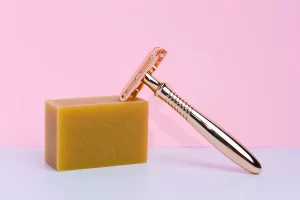
The type of plastic in disposable shavers usually cannot be recycled. Opt instead for a stainless steel safety razor with recyclable stainless steel blades. Shaving cream comes in aerosol cans, which are recyclable, but only if they’re clean – which is hard to do, especially if you’re in a hurry. Consider organic package-free shaving soap instead.
9. Makeup → Zero waste makeup
Even if the makeup is totally organic and biodegradable, many cosmetics come in plastic packaging, parts of which cannot go in curbside recycling. See here for a comprehensive list of zero waste makeup; many products are conveniently available on Etsy.
10. Skin care → Zero waste skincare
While they may not all be zero waste, every drug store tends to have organic and cruelty-free skincare options available. At the very least, be sure to avoid cleansers and scrubs that include exfoliating microbeads: microbeads are microplastics that are too small to be filtered out of the water and they end up as ocean pollution.
Conclusion
Remember, don’t throw away any of the less sustainable items on the list. Before you make the swap to these zero waste bathroom items, use, donate, or repurpose the items you have first. Then, seek out reusable and zero-waste alternatives the next time you need mouthwash, a hand towel, or some new soap.
Which swap do you see yourself making first? Starting your sustainability journey by swapping out bathroom products and appliances is the perfect place to begin, because your body will feel the difference when you use all natural products. It’s easy to feel good about yourself when you make good choices for yourself and the planet.

